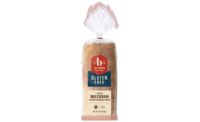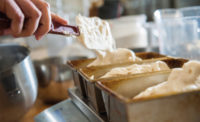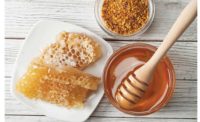In “Gulliver’s Travels,” protagonist Lemuel Gulliver famously noted, “Necessity is the mother of invention.” This maxim found smart application as Gulliver adapted to his new life in Jonathan Swift’s tale, and many an innovator has since resonated with its enterprising message.
Innovation likewise arose when Christi Skow received a diagnosis of celiac disease in 2007—and from her ensuing search for pleasing gluten-free foods that would form a regular part of her diet moving forward.
“It was a time when gluten-free food options were scarce and generally tough to stomach,” says Danielle Benjamin, marketing manager, Canyon Bakehouse, Loveland, CO. “The gluten-free breads available were tasteless, lacked in ‘real bread’ texture and were void of any nutritional value.”
Luckily, Christi—co-founder of the bakery and its spokesperson—found herself closely tied to keen catalysts of invention. Her husband, Josh Skow, co-founder and CEO, has a long history in the food industry. And, at the time, his good friend, Ed Miknevicius, co-founder and master baker, was the director of research and development at a large natural bread company.
Together, the trio set out to prove that they could build a better gluten-free bread.
Forming the Canyon
It wasn’t enough to just be gluten-free. “Josh and Ed worked together to create gluten-free breads that held up to the taste and texture of ‘real’ bread,” says Danielle, “but also upheld the artisan-made and nutritional quality many breads—both gluten-free and gluten-full—lacked, such as natural ingredients, GMO-free and made with 100 percent whole grains.”
The net effect raised the bar. “Shoppers continually want improvement,” says Danielle.
Josh earned his bachelor’s degree in Grain Science & Management from Kansas State University, Manhattan, and attended AIB International’s School of Baking. He then worked as a production supervisor for Interstate Brands Corp. He subsequently held various positions in bakery allied companies, including Grain Millers, AB Mauri and Beneo. “Most of my career was on the allied ingredient side, selling raw materials, technical sales and marketing,” Josh says.
Josh and Ed are fond of fishing in the Front Range of the Rocky Mountains near Loveland—a spot that inspired the idea of naming the business Canyon Bakehouse. The company logo pictures an artistic rendition of Loveland’s Big Thompson River and Canyon—a trout fly-fishing paradise.
Canyon Bakehouse grew from the foundation of Josh and Ed’s significant baking backgrounds. At the point of startup, the owners did everything. Today, the company supports more than 100 employees. And it all started with a loaf of bread.
“We had one product to show to a customer,” says Josh. “We showed it to Whole Foods Rocky Mountain Region, and they said they’d put it on the shelf. That’s how our business started.” Whole Food Market’s Rocky Mountain Region includes Colorado, Utah, New Mexico and Kansas. “You have a few sales calls in your life that blow your mind,” he says. “This was one of them.”
More products soon followed, prompted by the success Canyon Bakehouse saw at Whole Foods.
“We didn’t have big money backing us,” says Josh, who went full-time with the bakery in 2011. “We funded this ourselves. Other than paying ourselves to live, we sunk every dime back into growing the business.”
The Canyon grows
“We didn’t necessarily buy equipment and take on space until we needed it, and generally, then it’s too late,” says Josh. “So in the four or five years of growing the company, it was kind of like, ‘We needed that yesterday.’”
In 2012, Canyon Bakehouse moved into its current facility, a 20,000-square-foot building, initially occupying 10,000 square feet with an option on the other 10,000. “Within six months, we took the other 10,000,” says Josh, “and recently we took another 10,000 of adjacent warehouse for a total of 30,000. We grew pretty....year.”
The bakery expanded its product lineup through the years, adding new loaf breads and products like buns and muffins. Brownie Bites and bagels are next. “The Brownie Bites allow us to move into a dessert/snacking opportunity,” says Kevin Brouillette, vice president of sales and marketing. “They’re both really good incremental opportunities for us.”
While new products have steadily surfaced, Canyon Bakehouse is continually working to gain better market penetration, notes Kevin. “We still have huge opportunities with just our core line,” he says. “People eat bread every day.”
In 2014, the bakery started to try to get ahead of its production capabilities. “We bought more ovens than we needed, more proof boxes, more mixers, etc.,” says Josh. “We didn’t need all of that for 2014, but we were ready for this year. It’s the first time that we were ready ahead of time.”
The bakery also redesigned its logo and launched new packaging in 2014, notes Danielle. “Shortly after, we launched a redesigned website,” she adds. “We wanted to update our overall look to make the packaging pop on store shelves and to keep our products distinct as we continue to grow and expand our product offerings.”
The facility is certified gluten-free by the Gluten-Free Certification Organization. The products fit into generally accepted “free-from” criteria, as they are also dairy-free, GMO-free, soy-free and nut-free. The one allergen the bakery has been unable to eliminate is eggs, as their functionality in the mix has proved indispensable.
Distribution spans across all 50 states, in more than 8,000 stores—including Target, Whole Foods Market, Wegmans Food Markets, Kroger, Safeway, Giant Food, Stop & Shop, Hy-Vee, Ralphs, Raley’s, Sprouts Farmers Market, Natural Grocers and Costco—and all of Canada via Loblaw Cos. Ltd. It also distributes to several colleges and universities, and recently broke the international boundaries with new exports to the Middle East. (For insight into gluten-free product merchandising, see "Canyon Bakehouse: a question of merchandising.")
The bakery’s goal has never been to try to be first to market with its products. Rather, as Josh says, “We try to be ‘best to market.’ Whatever we put out, we want it to be the best, most-premium product in terms of value, taste and quality.”
The bakery’s best-selling product is the 7-Grain bread. Deli Rye tends to sell better on the coasts. “It doesn’t have rye, since rye contains gluten, but is has the caraway seeds,” says Josh Skow. “We use a natural sourdough starter to make it. It’s truly a unique, artisan-flavored bread.”
Artisan amidst automation
The bakery has crafted artisan characteristics into its products—positioning that has required careful balancing when facing the necessity of increasingly automating more aspects of production.
Just by the nature of the bakery’s process, the products have a certain amount of variation—a characteristic directly aligned with how shoppers perceive “artisan.” That said, Josh notes that automating select aspects of production can help narrow the degree of variation, tightening the desired specification range for the products. And with requisite demand for the products—and the capital that brings—automating operational aspects like depanning, cooling, slicing, bagging and boxing has already begun, and will continue as expansion progresses. Some ingredients, like agave nectar and olive oil, are pumped and automatically scaled for batches. He also notes that sourcing product-specific bakery premixes might be a way to help standardize some aspects of production in the future.
“The unique aspect to our process is mostly on the raw side, the makeup side, where we’re mixing dough and getting it into the pan,” says Josh. “It’s very unique, and it’s very hard to do for our products.” He notes that there’s a certain hands-on aspect to that part of the operation that might never go away.
“And on the very front end of that,” says Kevin, “the ingredients that we use are ingredients that you’re going to find in your pantry.” He notes that “artisan” is something that “you know it if you feel it. It looks and feels like a loaf of bread that you would bake at home. It doesn’t look like something that was molded into a ‘bread-like substance.’ People try it for the first time and they say: ‘Wow! This is like real bread!’ And we say, ‘It is real bread. It’s just not made with wheat.’”
Christi notes that “a big part of the resulting quality of the breads is in the ingredients that we source.”
The bakery also strives toward environmentally friendly sourcing. “We prioritize the ingredients we source—both in nutritional consistency and impact on the environment—like no GMOs, natural and organic ingredients, etc.,” says Danielle, “and we currently have a recycling program in place. Our goal, over the next year, is to look for ways to make our facility more efficient.”
Ed continues to analyze his formulas to find areas for improvement. The bakery is now in the process of converting to fresh yeast for its products. “Most dry yeast products contain a processing aid called sorbitan monostearate,” he says. “We decided that we did not want to have this in our products, which precipitated the change. Fresh yeast does not contain this processing aid.” He notes that the change will not impact the characteristics of the products.
Product specifications start with Ed. “Our master baker has an idea in his head of what the bread needs to be like, whether it’s how high it needs to be, the color on it, the crumb structure,” says Josh.
The loaf breads develop a signature crust that Ed says comes from the “fairly long bake times” the products require.
Safe and secure
Every gluten-free bakery relies on maintaining a tight supply chain. “We have a process that we use to verify our suppliers and our products coming in and test key raw materials coming in,” says Josh. “For example, we use a lot of brown rice flour. We randomly test that product coming in on a regular schedule. The ingredients are gluten-free-certified, but we’re double-checking on our end.”
When Canyon Bakehouse products say they’re gluten-free, they mean it. “When we started back in 2009, there wasn’t a standard for how much allowable gluten could be in a product,” says Josh. “Now the government has said that the limit is 20 ppm. We’ve never operated at that level. We always felt that if it’s gluten-free, it’s gluten-free—meaning there’s no gluten in it.” He notes that current scientific testing methods for gluten do not allow for indications below 5 ppm. “The acceptability range for our finished products is when the test comes back as undetectable.” The bakery regularly sends finished products to the University of Nebraska and other local, third-party labs for testing.
“If we found 20 ppm of gluten in one of our products, we would shut the plant down,” says Kevin.
The business is also in the process of ramping up food safety to meet Safe Quality Food Institute (SQF) certification. “We’ve had to add significant staff,” says Josh. This includes adding a quality-assurance (QA) department and a QA tech on every shift. “We’ve invested heavily in this, but it’s the right thing to do. It’s peace of mind.”
Josh also notes that the bakery has launched an enterprise resource planning (ERP) platform, “which, from an SQF perspective, is significant. Now, I can do a forward or backward recall in, literally, seconds. We have scan guns to scan-in all of our raw materials, traced to every single batch, all the way to going out the door. We didn’t necessarily have to go with ERP at this stage in the game, but it brings certain efficiencies, and data is huge. Information is power.”
Brouillette notes that the “secret sauce” of the company goes back to its origins, its core—a family living with celiac disease that sought to innovate and build a better loaf of gluten-free bread. This all-encompassing quest has forever changed lives and set new career paths into motion. And I’m sure we’re bound to see much innovation yet to come from this groundbreaking bakery.
At a Glance
Key Personnel:
Current Canyon Bakehouse product range:











